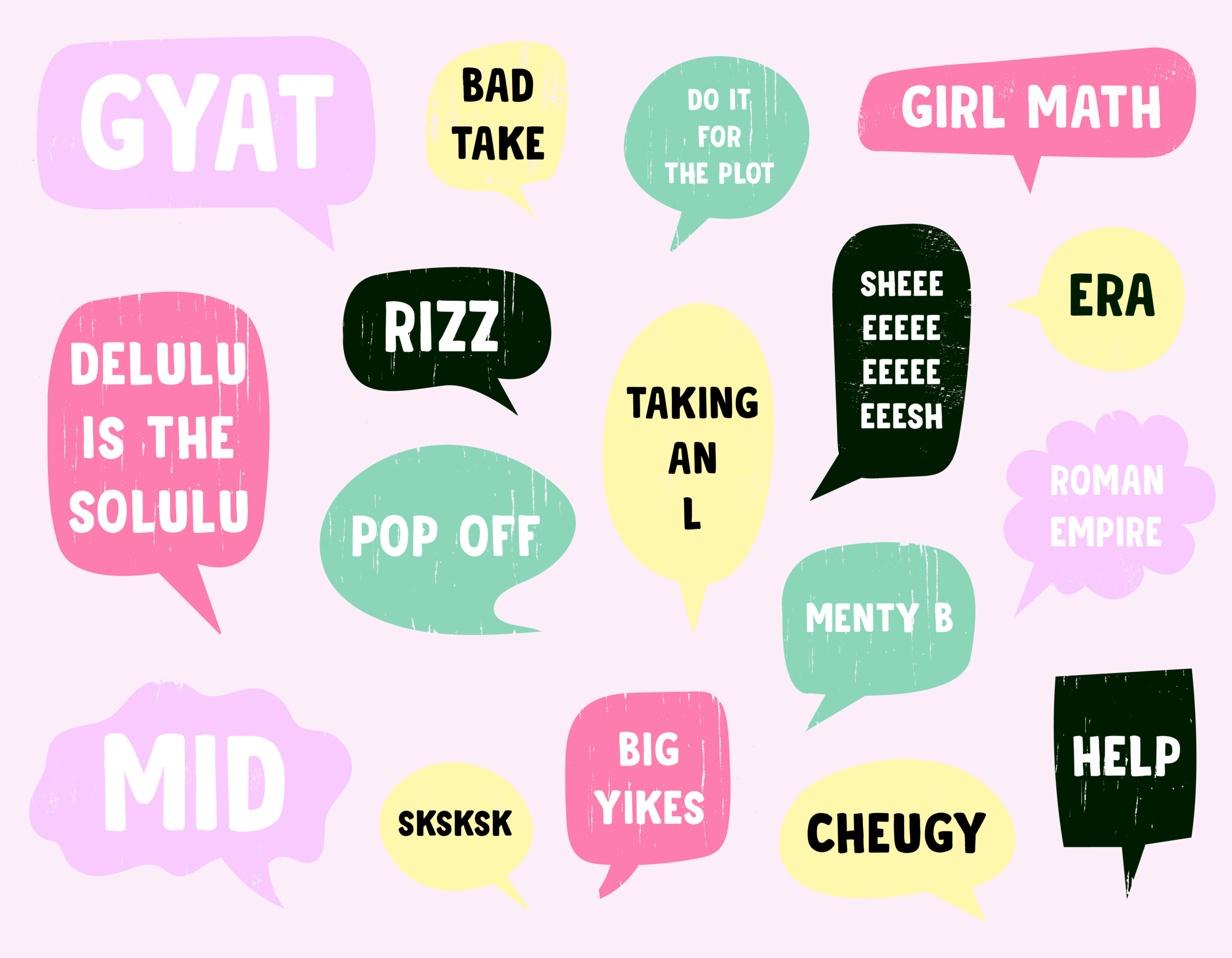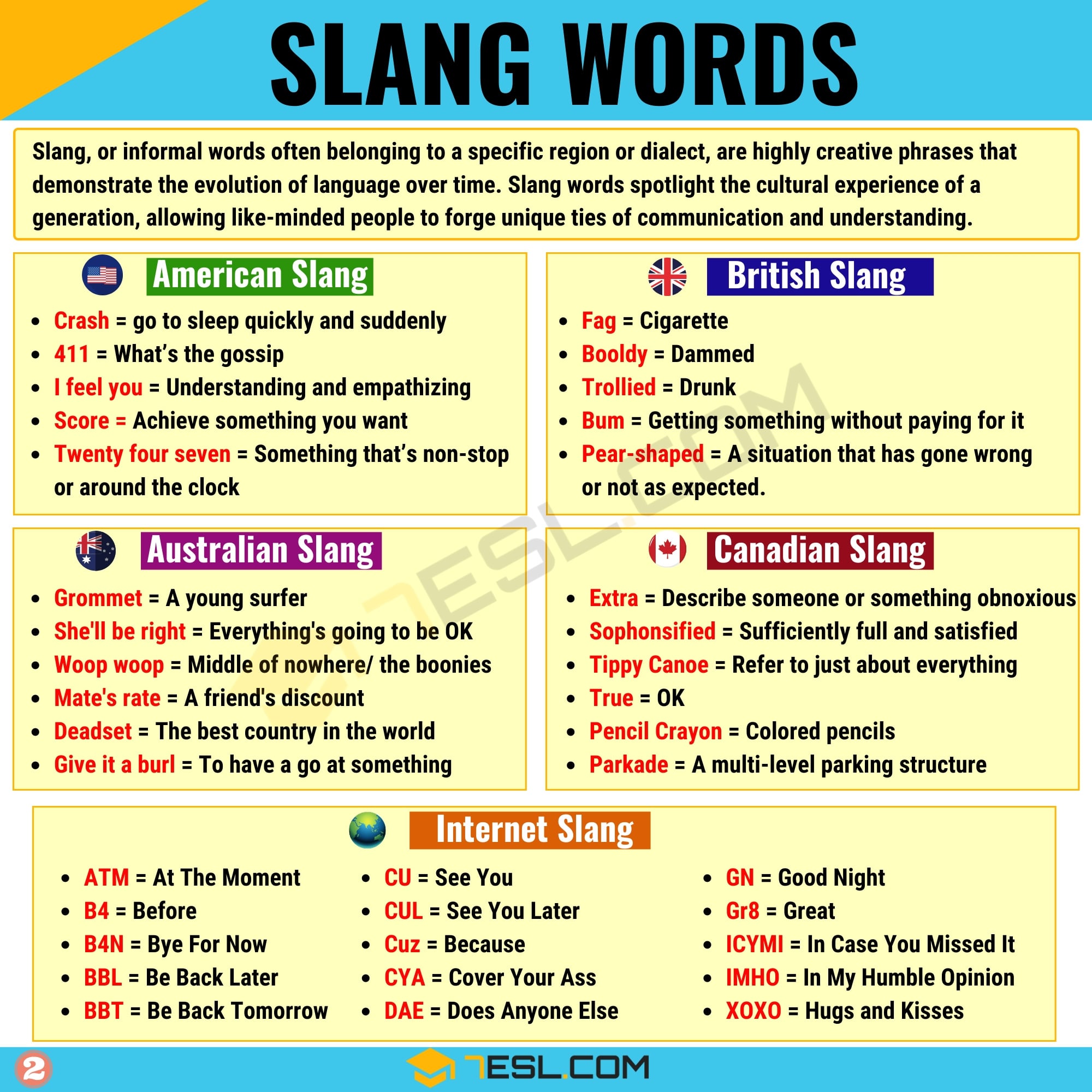You know what’s wild? The way language evolves faster than we can keep up with it. Today, slang is everywhere—on TikTok, Instagram, Twitter, and even in casual conversations. If you’re scratching your head over what "vibing" or "spilling tea" means, don’t worry—you’re not alone. Current slang is a fascinating glimpse into how culture and communication shape each other. So, buckle up because we’re diving deep into the world of modern lingo!
Let’s be real for a second. Slang isn’t just about sounding cool or trendy; it’s about connecting with others on a deeper level. Whether you’re trying to fit in with younger generations or simply want to understand what your favorite influencers are talking about, staying up-to-date with current slang is essential. And trust me, it’s way more fun than you think!
In this article, we’ll break down everything you need to know about current slang—its origins, how it impacts communication, and some of the most popular terms making waves right now. By the end of this, you’ll be dropping slang like a pro and impressing everyone around you. Ready to get started? Let’s go!
- Jason Momoa Net Worth The Inside Scoop On Aquamans Bank Account And Beyond
- Michael Jackson And Lisa Marie Presley The Untold Love Story That Shook The World
Why Current Slang Matters
Understanding Cultural Evolution Through Language
Language isn’t static—it’s alive, breathing, and constantly evolving. Current slang reflects the cultural zeitgeist, capturing the mood, values, and trends of a particular time. For instance, terms like "woke" and "lit" emerged from social movements and pop culture, becoming part of mainstream vocabulary almost overnight.
But why does this matter? Well, understanding current slang helps us bridge generational gaps, connect with diverse communities, and stay relevant in an ever-changing world. It’s like having a secret code that unlocks deeper conversations and relationships.
How Slang Shapes Communication
Think about it: when you use slang, you’re not just saying words—you’re expressing identity, humor, and belonging. Slang adds personality to our conversations, making them more engaging and relatable. For example, saying "I’m vibing with that" feels a lot cooler than "I agree with that," right?
- Walmart Oven Death The Shocking Truth Behind The Headlines
- Shows That Are Similar To Game Of Thrones Dive Into Epic Fantasy Worlds
Moreover, slang often simplifies complex ideas, making them easier to digest. Instead of explaining a long story, you can just say "long story short" and move on. Efficient, isn’t it?
Top Current Slang Terms You Need to Know
Now that we’ve established why slang matters, let’s dive into some of the most popular current slang terms making waves in 2023. These aren’t just random words—they’re cultural phenomena that have taken the internet by storm.
1. Vibing
If someone says they’re "vibing" with something, it means they’re feeling good about it or resonating with it. This term has roots in music and energy, where vibes refer to the atmosphere or mood of a situation. Example: "I’m really vibing with this playlist—it’s perfect for studying!"
2. Spilling Tea
Spilling tea is all about sharing juicy gossip or revealing secrets. It’s often used humorously or dramatically, adding a flair of excitement to any conversation. Example: "Girl, I saw them making out at the party—spill the tea!"
3. Low-Key
Low-key means something is subtle, understated, or not overly obvious. It’s often used to describe feelings or actions that aren’t meant to draw attention. Example: "I’m low-key obsessed with this new show, but I don’t want anyone to know." Contrary to "high-key," which is the opposite.
The Origins of Slang
Ever wondered where slang comes from? It’s not just random wordplay—it’s deeply rooted in history, culture, and community. Many slang terms originate from marginalized groups, such as the LGBTQ+ community, Black culture, and youth subcultures. These groups often create their own language as a form of resistance, identity, and empowerment.
For instance, words like "fleek" and "bae" were popularized by Black Twitter before entering mainstream vocabulary. Similarly, terms like "queer" and "drag" were reclaimed by the LGBTQ+ community to reclaim their power and visibility.
How Social Media Shapes Current Slang
The Role of TikTok
TikTok has become a breeding ground for new slang terms. With its short-form video format, creators can quickly introduce and spread new words and phrases to millions of viewers. For example, the term "soft serve" gained popularity through TikTok challenges, where users shared videos of themselves being "soft serve" or "hard serve" in different situations.
Instagram and Twitter
Instagram and Twitter also play a significant role in shaping current slang. Hashtags, memes, and captions often incorporate trendy terms, making them go viral in no time. For instance, hashtags like #vibing or #spillingtea can quickly gain traction, encouraging users to engage with the trend.
The Impact of Current Slang on Communication
While slang adds flavor to our conversations, it also poses challenges. For one, it can create barriers for those who aren’t familiar with the terms. Imagine trying to follow a conversation where everyone is "spilling tea" and "vibing" without knowing what those mean—it can get confusing!
However, the benefits often outweigh the drawbacks. Slang fosters inclusivity, creativity, and connection, allowing people to express themselves in unique ways. It’s all about finding the right balance and being open to learning new terms.
Common Misconceptions About Slang
There are plenty of myths surrounding slang, and it’s time to set the record straight. Here are a few common misconceptions:
- Slang is just for young people: Nope! People of all ages use slang to connect with others and stay relevant.
- Slang is unprofessional: Not necessarily. In the right context, slang can enhance communication and make it more relatable.
- Slang will ruin the English language: Language has always evolved, and slang is just another chapter in its story. It’s not destroying anything—it’s expanding our vocabulary!
Practical Tips for Using Current Slang
Ready to start using current slang in your conversations? Here are some tips to help you do it right:
1. Know Your Audience
Not all slang works in every situation. Consider who you’re talking to and whether they’ll understand the terms you’re using. For instance, saying "vibing" to a group of older colleagues might not land as well as it would with friends.
2. Stay Updated
Slang changes fast, so it’s important to keep up with the latest trends. Follow influencers, join online communities, and listen to podcasts to stay in the loop.
3. Use Slang Authentically
Nothing screams "try-hard" more than forcing slang into a conversation. Use it naturally and authentically to avoid coming off as insincere.
Conclusion: Embrace the Power of Current Slang
And there you have it—a comprehensive guide to current slang and its impact on communication. Whether you’re vibing with the latest trends or spilling tea with friends, slang is a powerful tool that connects us all. So, don’t be afraid to dive in and experiment with new terms. Who knows? You might just start the next big trend!
Before you go, here’s a quick recap of what we covered:
- Slang reflects cultural evolution and shapes communication.
- Popular current slang terms include "vibing," "spilling tea," and "low-key."
- Social media platforms like TikTok, Instagram, and Twitter play a significant role in spreading slang.
- Using slang effectively requires understanding your audience and staying updated.
Now it’s your turn! Share your thoughts in the comments below or tag us on social media with your favorite slang term. Let’s keep the conversation going and make language fun again!
Table of Contents
- Why Current Slang Matters
- Understanding Cultural Evolution Through Language
- How Slang Shapes Communication
- Top Current Slang Terms You Need to Know
- The Origins of Slang
- How Social Media Shapes Current Slang
- The Impact of Current Slang on Communication
- Common Misconceptions About Slang
- Practical Tips for Using Current Slang
- Conclusion: Embrace the Power of Current Slang
- Alex Vause The Woman Who Stole Everyones Hearts In Orange Is The New Black
- Lynda Lopez The Rising Star Whorsquos Taking The World By Storm


